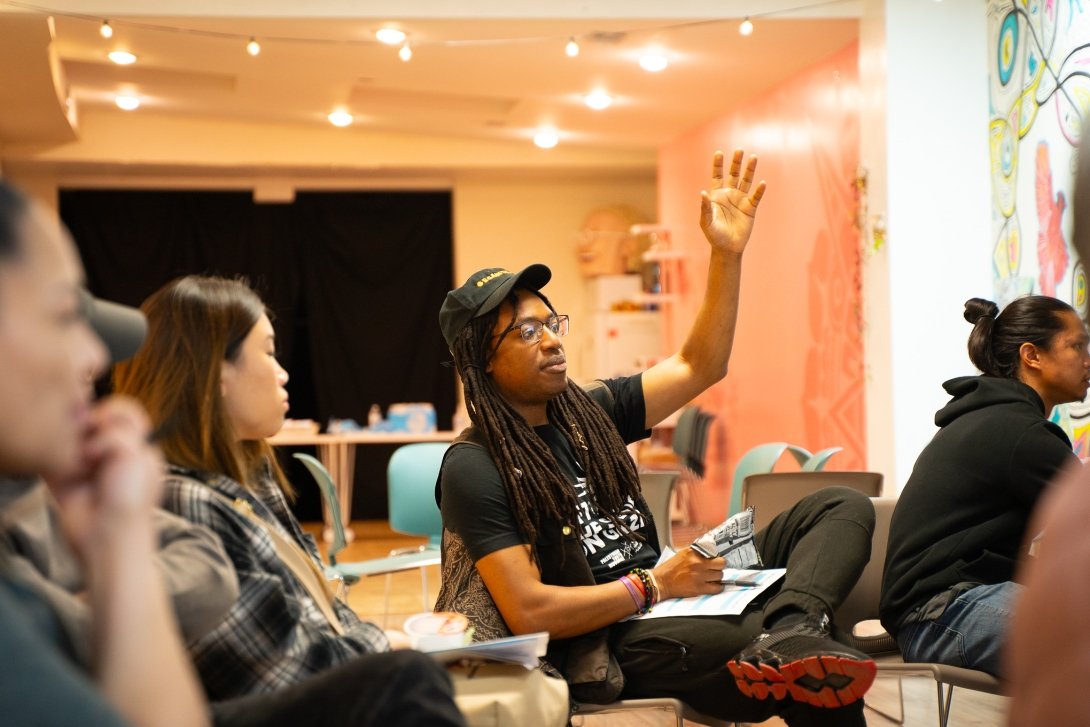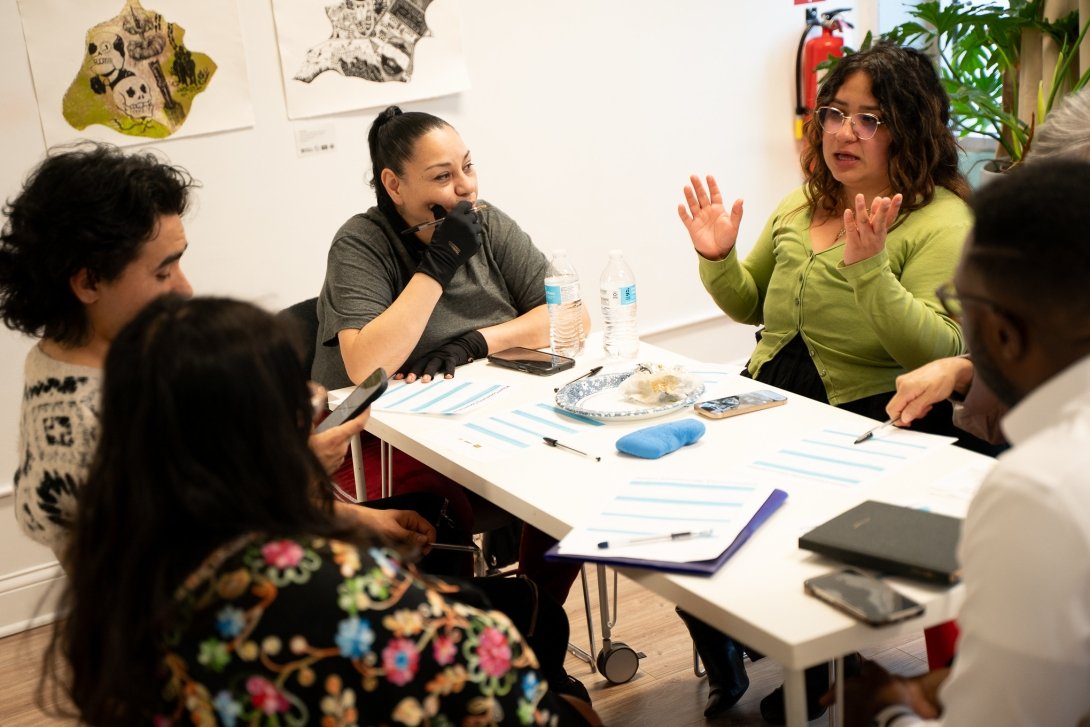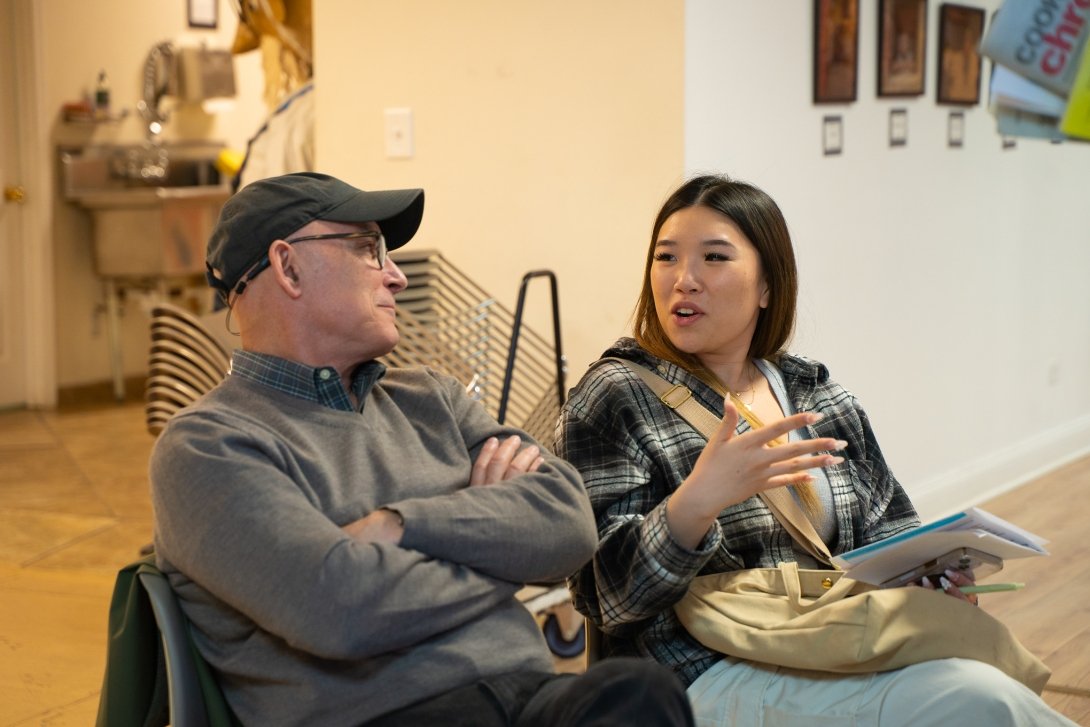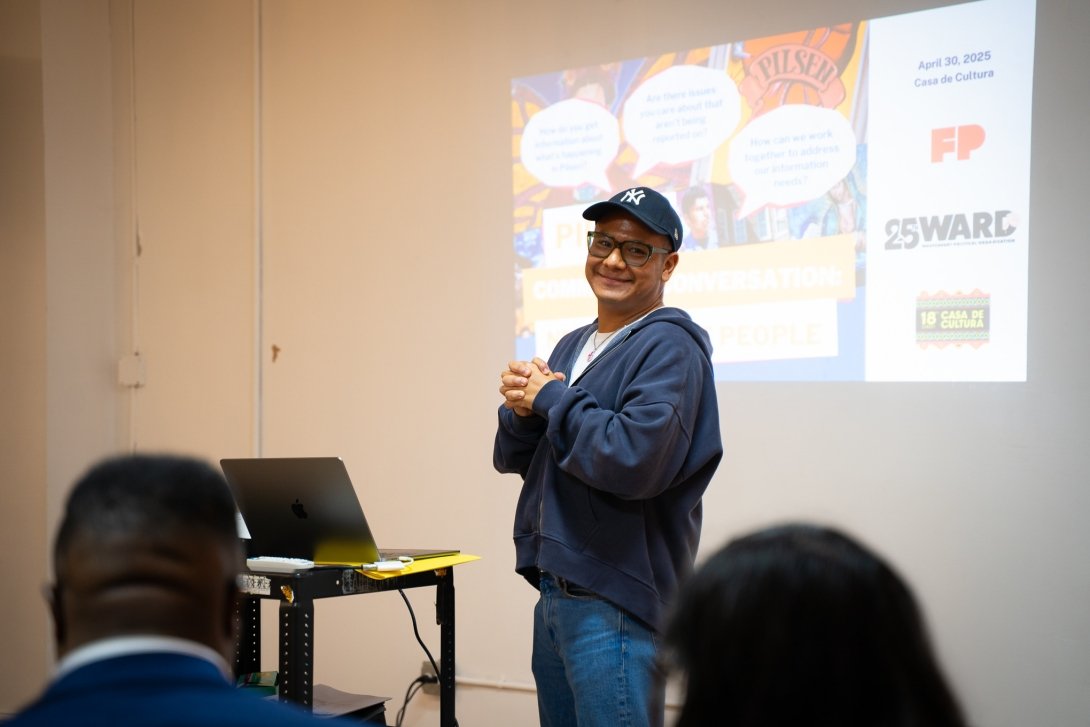Community Members in Chicago Advocate for the News They Need

At Free Press’ event in Chicago’s Pilsen neighborhood, people said that the media’s coverage of their community is overwhelmingly negative.
Courtney Morrison
I’m Rafa Muñoz, the civic media campaign manager in Illinois for Free Press. I’m based in Chicago and most recently I worked on the Documenters Network team at City Bureau. Prior to that I did civic engagement and organizing work, from supporting restaurant workers in their unionizing efforts to facilitating trainings on how to canvass.
On April 30, we kicked off Free Press’ campaign in Illinois by hosting a community-conversation event in my own neighborhood of Pilsen in Chicago. The goal was to bring neighbors, journalists and civic organizations together to identify the neighborhood’s specific community-information needs. The event included individual and collective brainstorming, using worksheets that asked questions like “what stories in your neighborhood do you think should be told?”
Free Press is showing up in Illinois because of a serious need to identify and fill information gaps. According to the 2024 State of Local News Report from the Medill Local News Initiative, Illinois has lost over a third of its newspapers since 2005, while Cook County — where Chicago is located — lost about 40 percent during that same time period. While there are journalists doing great work, community members are not receiving information that would inform, engage and equip them to fully participate in their own communities.
The situation is especially dire in poor, rural and Black and Brown communities. We can’t solve the problem by simply bringing back the newspapers that have shut down. There’s also a centuries-old legacy of racism in the media to contend with: Our colleagues at Media 2070 have researched and documented the lineage of harm that the media system has inflicted and perpetuated on Black and Brown communities.
Through our campaign research and planning, Pilsen emerged as a community where we could plant the seeds for our campaign. The neighborhood is majority Latino, with Latinos making up about 70 percent of the population. As a person who lives in Pilsen, I know that there are information gaps in the neighborhood, highlighted by the fact that Pilsen does not have a primary source of news and information dedicated to covering the ins and outs of the neighborhood with language accessibility. And with a deep history of community organizing, we identified a number of civic groups in the neighborhood that could be potential partners.
Free Press teamed up on the event with leaders in the community
We partnered with the 25th Ward IPO, a Pilsen-based civic organization. This is a volunteer-run member organization that builds campaigns, hosts trainings and workshops, and creates spaces for Pilsen neighbors to join together. The group is particularly focused on gentrification and displacement in the neighborhood. Recently, it has hosted Migra Watch trainings as it builds Pilsen-specific teams to identify federal agents and document ICE activity.
We hosted our event at the Casa de Cultura in Pilsen, a community hub for artists, organizers and educators. Maya Zazhil Fernández, Jackie Rodriguez and Gina Gamboa opened their doors in 2021, and they host a range of events, from yoga classes to book clubs. The space is vibrant, colorful, kid-friendly and interactive, with a tiendita of books near the entrance, a large main room and a library lounge in the back.
Major takeaways
Through individual brainstorming and group discussions at the event, the following emerged as major themes.
There is a desire to document and preserve the neighborhood’s history — the people, places and events that shaped Pilsen and made it what it is today. People identified “Boogie” Gonzalez as an influential person in Pilsen’s history of violence interruption.
Community members identified gentrification, affordable housing, public safety and immigration as important issues that require further reporting.
TikTok and local organizations, like the 25th Ward IPO, are major sources of information for the community members who attended.
People feel that the overall coverage of the neighborhood is overwhelmingly negative, and folks would like to see more positive reporting. Through a headline exercise we did at the event, it was clear that most of the current coverage of Pilsen is related to crime and violence.
Next steps for Free Press’ journalism work in Illinois
This first event kicked off a broader Illinois campaign, with a vision of introducing and passing legislation that strengthens access to information and supports local news. We will build on this event by nurturing and developing our existing relationships, building new relationships through our upcoming community-conversation events and continuing to create spaces to talk about policy change for local news and information in Illinois. We are building a statewide coalition of journalists, community members and civic organizations to help support these efforts.
Reach out to me if you want to get involved. Later this summer, we plan to host our second community-conversation event on the South Side of Chicago.
Check out some photos from our event below — and donate today to help Free Press keep working to ensure communities have the news and information they need.

Courtney Morrison

Courtney Morrison

The author, Rafael Muñoz-Echavarria, facilitating the event in Pilsen
Courtney Morrison